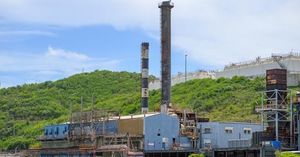The recent volcanic activity from Mount Lewotobi Laki-laki in Indonesia has stirred concerns and disruptions across international flight schedules, leaving many travelers stranded or uncertain about their travel plans. This situation came to the forefront last week when the volcano erupted multiple times, sending ash plumes soaring as high as 10 kilometers (about 32,800 feet) and resulting in widespread flight cancellations to and from Bali, one of the most beloved vacation spots.
Following these eruptions, Air New Zealand, which contributes significantly to travel between New Zealand and Bali, was forced to pause its flights. During this short-lived hiatus, the airline was actively monitoring the ash cloud's movements and conditions to keep its passengers informed. Thankfully, by the end of the week, Air New Zealand announced the resumption of its flights, signaling some relief for those itching to get back to the sunny shores of Bali.
For travelers caught up in the cancellations, the numbers were staggering. More than 160 flights were scrapped between November 4 and November 13, with Thursday, November 9, seeing the highest cancellation rate, affecting 91 flights alone. Ahmad Syaugi Shahab, the general manager of Bali's Ngurah Rai airport, reported these figures, shedding light on how massive the impact of volcanic ash can be on travel itineraries.
Located around 800 kilometers (497 miles) away from Bali, the East Nusa Tenggara province was the source of the eruptions. The consequences have been severe: the initial eruption at the beginning of November led to the tragic loss of at least nine lives and prompted the evacuation of approximately 13,000 residents as safety measures were swiftly enacted. Homes have been damaged extensively, with reports indicating over 2,000 houses affected.
While Air New Zealand was quick to resume its services after evaluating the situation, other airlines were not far behind. Virgin Australia also declared the resumption of all scheduled flights to and from Denpasar, Bali's main airport. Meanwhile, Jetstar and Qantas announced the return of several flights, citing improved conditions which made flying safe again.
The major upheaval of flights due to such natural occurrences is not something new. Volcanic activity can significantly impact air travel due to the dangers posed by ash clouds, which can severely impair visibility and damage aircraft engines. For many travelers, this disruption means not only delayed vacations but also unexpected logistical headaches.
Travelers understand the risks associated with flying near volcanic regions, and as Mother Nature has shown, these events can happen without warning. So, those hoping for nothing but smooth sailing to their holiday destination must remain vigilant and monitor updates closely during such volatile periods.
Despite these hurdles, the resilience shown by airlines and authorities showcases the importance of safety protocols and communication. The rapid response by Air New Zealand and other airlines highlights their commitment to passenger safety and their determination to get travelers back on schedule as safely as possible.
So for anyone planning to visit Bali soon, the good news is flights have resumed, and with the threat of ash clouds apparently diminishing for now, sunshine and beaches are once again within reach. It’s always wise though to check airline communications regularly and stay updated on any potential future changes due to volcanic activity. Traveling with awareness pays off, especially when nature throws unexpected challenges our way.



